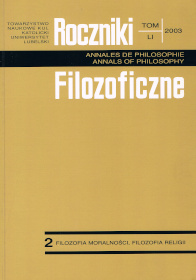Teologia w czasach braku jedności nauki
Abstrakt
Prior to the twentieth century, religious thinkers developed their understandings of the relationship between natural science and theology in contexts in which natural science presented a theoretically unified account of nature − first, for example, the Aristotelian account of nature that so powerfully influenced the work of Saint Thomas Aquinas; and later the Newtonian account of nature that influenced numerous directions in religious thought following the seventeenth century. The twentieth century, and now the twenty-first century has come to accept understandings of physical nature without a requirement of theoretical unification. This lack of theoretical unification within the natural sciences must lead religious thinkers to engage their theologies with natural science in a manner more piece-meal than in earlier times. This presents both opportunities and challenges for theological development. The nominalist tradition may be in this context seen as a source for this development.
Copyright (c) 2003 Roczniki Filozoficzne

Utwór dostępny jest na licencji Creative Commons Uznanie autorstwa – Użycie niekomercyjne – Bez utworów zależnych 4.0 Międzynarodowe.





